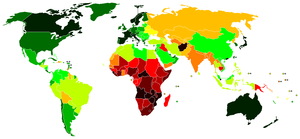 How to determine life expectancy change of air pollution mortality: a time series study (35 page pdf, Ari Rabl, Tq Thach, Pyk Chau and Cm Wong, Environmental Health, Mar.31, 2011)
How to determine life expectancy change of air pollution mortality: a time series study (35 page pdf, Ari Rabl, Tq Thach, Pyk Chau and Cm Wong, Environmental Health, Mar.31, 2011)Today’s review article examines the important question asked when a policy to improve air quality, such as a congestion pricing, is introduced- what difference would this make to mortality rates and life expectancy? The authors used data from Hong Kong and found a lower bound only to the answer, restricted as they were to a 5 year window used to assess the correlation lag between cause and effect.

Key Quotes:
“For rational environmental policy one needs to know the life expectancy (LE) gain that can be obtained by a permanent reduction in exposure”
“there are two distinct features that are reflected in the coefficients of a TS with extended observation window: one is the lag between exposure and the resulting premature deaths, the other is the magnitude of the individual LE losses corresponding to those deaths. The present paper examines what can be learned from TS about LE loss”
“Air pollution does not change the total number of deaths, it merely advances the date of deaths"
” A calculation according to Eq.10 (but with time step 4 years instead of 1 day) yields an LE loss of 39 days per 10 mg/m3 increase of black smoke and 48 days per 10 mg/m3 increase of SO2.. Typical results are around 90 days per 10 mg/m3 of PM 10 “
Related articles
- Modelling Exposure to Health Risks from Air Pollution (pollutionfree.wordpress.com)
- Polluted Air and Poor Health in UK Cities (pollutionfree.wordpress.com)
- Shanghai air pollution reaches record levels - how to track air quality around the world (environmentaleducationuk.wordpress.com)
- Proximity to Traffic Air Pollution and Birth Outcomes (pollutionfreecities.blogspot.com)

No comments:
Post a Comment